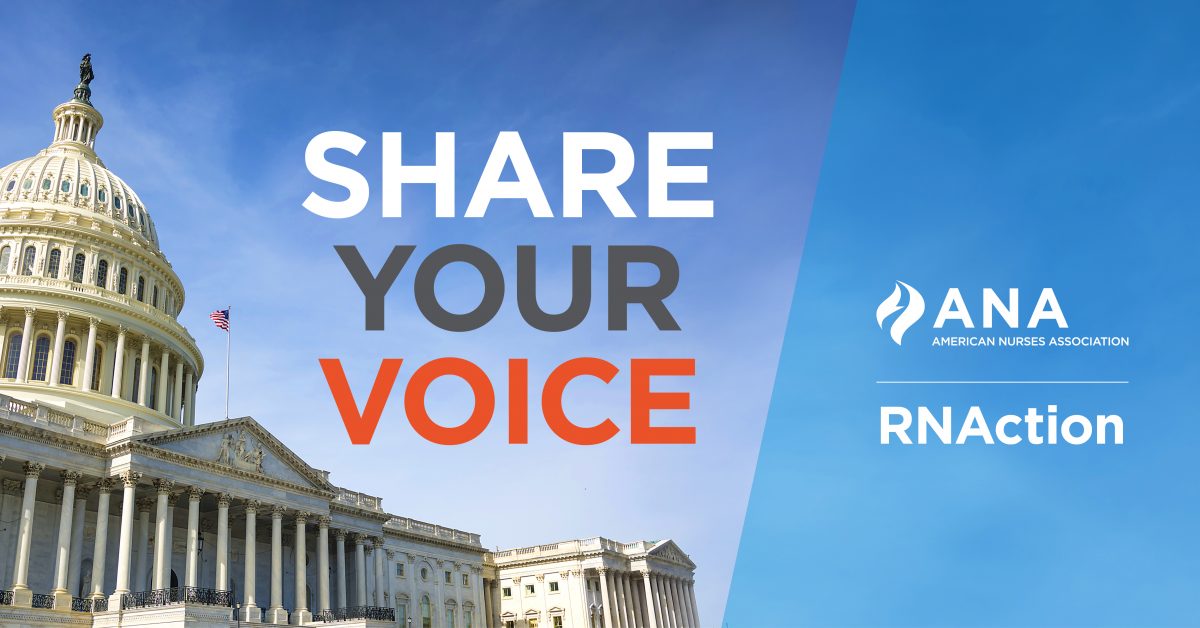ANA’s annual Membership Assembly (MA) held in June has gone virtual resulting in the cancellation of our popular Hill Day. ANA staff quickly pivoted and launched a supercharged, nationwide Virtual Day of Advocacy centered on a call to action. This Virtual Day of Advocacy will take place on June 25 – Take Action Here! Our call to action focuses on rebuilding the public health workforce and infrastructure by funding community-based care and the CDC so our nation can better withstand the COVID-19 pandemic and the next national health crisis and build towards a future of strength.
Why a Day of Advocacy? We moved to a Day of Advocacy this year which involves one call to action as opposed to the typical 3-4 legislative issues solely focused on nursing priorities. We abandoned a virtual hill day because it was not fair to ask nurses working all hours and continue to combat the COVID-19 pandemic to take time out of their day for a phone call that is extremely difficult to schedule among participants with varying schedules. The Virtual Day of Advocacy provides a much easier and public platform for nurses and nurse advocates to make their voices heard.
Who does this target? By leveraging our call to action platform, we’re able to make this much larger and all-encompassing campaign than our typical Hill Day. We also acknowledge our regular participants will miss out on the wonderful experience of a coordinated Hill visit to see their members of Congress and their staff. However, as opposed to the limitations of inviting only MA attendees, local nursing students and members from the tri-state Washington Metro area, ANA staff are able to open this campaign up through social media (RNAction Facebook and Twitter), all ANA members, nursing schools throughout the U.S. through a coordinated effort with our constituent state nurse affiliate connections so staff can drive increased participation and growth of our RNAction grassroots community. Last but not least, through a Washington Post partnership, we’ve procured advertisements for the Day of Advocacy to both members of Congress and their staff along with nurses and the general public.
Additional Information: ANA’s Policy and Government Affairs team has released a video on why advocacy is important, how to take action, personalizing your message and how to send and/or Tweet to your members of Congress.
What’s next? As you are taking action and sending your letter/tweet to Congress, please take an advocacy selfie and post that using the #RNAction hashtag or @RNAction handle. We are also asking all of those who participate in our Day of Advocacy to continue subscribing to our RNAction alerts and participate in future calls to action. COVID-19 has shown once again the impact of nursing on the overall health and well being in the U.S. We are asking all of those who join our community through this Day of Advocacy to make the commitment to not make this a one-time action. Pledge to continue advocating for nursing and amplify their voice on the national stage.
Nurses continue providing care and performing tremendous acts of kindness in the wake of this devastating pandemic. This despite varying degrees of a lack of protective equipment or resources and added strain to their families and loved ones. ANA’s Virtual Day of Advocacy provides an engaging platform for nurses, nurse advocates, nurse administrators, nursing students – and anyone interesting in promoting the nursing profession – to share their story and make their voice heard. So, share your voice and take action from now through June 25.

